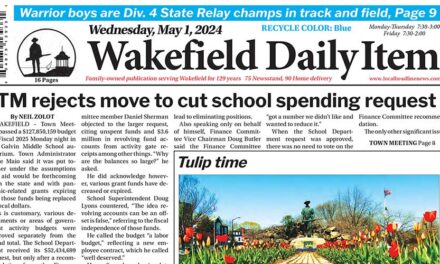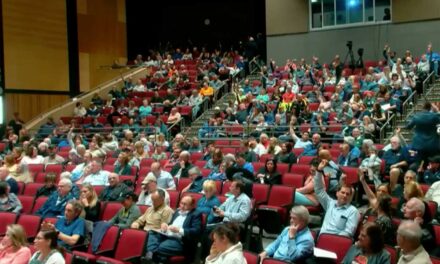Published in the July 13, 2020 edition.
By MARK SARDELLA
WAKEFIELD — Town Counsel Thomas Mullen has filed on behalf of the town an 18-page argument opposing a request by Robert Mitchell of Spaulding Street for a preliminary injunction with respect to his complaint in Middlesex Superior Court against the town.
On June 30, Mitchell filled his initial complaint asking the court to grant relief from Town Charter requirements regarding the number of signatures required to place on a town-wide ballot a June 20 Town Meeting article approving $9.6 million to expand and renovate the Public Safety Building. In addition to requesting that the required number of signatures be reduced by half, Mitchell requested that “electronic signatures” be deemed acceptable. Mitchell also asked the court to extend the deadline for collecting such signatures.
Mitchell maintains that the town had failed to provide adequate protective measures for those wishing to attend the June 20 Town Meeting. He further argues that social distancing rules related to COVID-19 hamper his ability to collect conventional “wet ink” signatures and that this is in conflict with his First Amendment right to petition the government for redress of grievances. That is the basis for his request for relief from the court.
On July 2, hours before the deadline for collecting signatures was set to expire, Mitchell went back to court and filed a “preliminary injunction for a short order of notice.” A short order of notice is a way of getting an issue before a judge in less than the normal waiting time for scheduling a hearing.
In Mullen’s opposition argument, he asks that the court deny Mitchell’s request for injunctive relief, which he says would render the original complaint moot. Therefore, he asks that the court also dismiss the original complaint, which will allow the town to proceed with the Public Safety Building project.
Article 5 on the June 20 Annual Town Meeting warrant sought $9.6 million for the rehab and expansion of the police side of the Public Safety Building. After a PowerPoint presentation by Police Chief Steven Skory followed by a lengthy discussion, Town Meeting voted 196-17 in favor of Article 5, easily surpassing the two-thirds majority required.
It was the second time in three years that Town Meeting has approved the PSB upgrade. In May of 2018, Town Meeting approved substantially the same plan by a vote of 168-41. But a group of citizens, led by Mitchell and Bob McLaughlin of Water Street, collected the required 200 signatures to place the Town Meeting article to a townwide ballot.
In the Special Election that followed on June 26, voters rejected the plan by 76 votes. The following September, the Town Council voted to create a 17-member Public Safety Building Reassessment Committee. Mitchell was a member of that committee, which determined that the issues with the building still needed to be addressed and recommended substantially the same plan to expand the footprint of the building out on the Union Street side.
When the Public Safety Building Reassessment Committee voted on the latest plan to rehab the building, Mitchell abstained while all other members voted in favor.
In his opposition argument, Mullen notes that since the last time Mitchell et al collected signatures to force a townwide ballot, Town Meeting has increased the number of signatures required from 200 to 2.5 percent of the total number of registered voters in town (approximately 460). Such a petition would have been due by July 2.
In countering Mitchell’s claims, Mullen notes that the town took “extraordinary and effective measures” to make the June 20 Town Meeting safe, postponing it until after the height of the pandemic and providing for social distancing at the meeting. The result, he notes, was an attendance figure comparable to recent years’ Town Meetings.
Mullen also cites what he calls Mitchell’s “lackluster effort to gather signatures.” On June 26, 2020, Mitchell presented to Town Clerk Betsy Sheeran 44 printed petition forms generated from the online form. Sheeran declined to accept these electronic signatures based on legal guidance she received from Mullen.
Mullen notes that on Monday, June 29, the Town Council held an emergency meeting in executive session to discuss the matter and the relief requested in Mitchell’s letter. But immediately following that meeting, Mullen emailed Mitchell explaining that the only relaxation of the existing rules that the Town Council agreed to was to extend the Town Clerk’s Office closing time by four hours — to 4:30 p.m. on the deadline day of July 2. But no form of electronic signature would be accepted and there would be no change in the deadline or the number of signatures required under the Charter.
By the deadline of 4:30 p.m. on July 2, Mitchell had submitted only 39 valid signatures for his petition, Mullen notes.
Mullen also challenges the legal basis for Mitchell’s complaint, two 2020 court cases where candidates in the State Primary were granted relief from the signature requirements on nomination papers due to the COVID pandemic. But Mullen noted that both of those cases were premised on the plaintiff’s constitutional right to run for office.
“By contrast,” Mullen notes, “there is no federal or state constitutional right to use a local referendum to second-guess a Town Meeting.” Mitchell’s right to place a referendum question on a town ballot stems solely from the Town Charter, Mullen asserted, and not from U.S. or the Massachusetts Constitution. The court, he submits, “has no power to re-write the Charter for the benefit of Mr. Mitchell or anyone else.”
Mullen also argues that for the court to reduce the number of signatures and extend the deadline, it would thwart the will of Wakefield’s voters, who only last year decided to increase the required number of signatures and fix the deadline at 12 days.
“It could not be clearer,” Mullen writes, “that the democratic will of the town is not to make it easier for Mr. Mitchell or others to undo the thoughtful work of Town Meeting.”
Mullen also maintains that Mitchell lacks standing to seek the requested relief from the court. The law, Mullen notes, states that only the Attorney general or 10 or more registered voters may so petition the court for relief.
“An aggrieved citizen,” Mullen writes, “may not resort to the Superior Court to enforce his town charter or seek declaratory relief concerning it unless he is joined by at least nine others.”
Mullen further maintains that Mitchell waited too long to file for preliminary injunctive relief.
“The plaintiff could have brought this action and filed a motion for preliminary injunction promptly upon finding himself on the losing side at Town Meeting,” Mullen notes. “That he chose to wait until after learning how few Wakefield voters cared to sign his petition speaks volumes.”
Finally, Mullen maintains that Mitchell fails the critical legal test of proving that his own risk of irreparable harm if the relief is denied by the court is greater than the risk of irreparable harm to the town if the relief is granted. That test, Mullen argues, favors the town.
“[Mitchell’s] right to demand that the town hold an election is entirely a creature of the Charter,” Mullen writes, noting that Mitchell cannot point to a constitutional right that supersedes the terms of the Charter.
“Having no property, liberty or other interest that could be offended by a literal application of the Charter,” Mullen states, “he cannot claim to anticipate any harm, irreparable or otherwise.”
On the other hand, Mullen argues, the town will suffer severe financial harm if the court grants the injunctive relief and concomitant delay sought by Mitchell. Interests rates on the municipal bonds that the town would use to borrow the money for the Public Safety Building project are currently at near record lows. Further, a delay would mean that the town could not take advantage of currently depressed construction prices due to the COVID recession.
For all of those reasons, Mullen asks the court, on behalf or the town, to deny Mitchell’s request for injunctive relief and to dismiss the original complaint as moot because the referendum deadline has long since expired.




